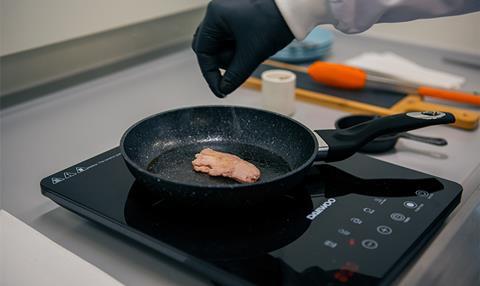A UK-based company specialising in cell-based tissue engineering has produced the first-ever steak fillet of cultivated meat.

The scientific breakthrough was achieved by a team of scientists at 3D Bio-Tissues (3DBT), a Newcastle-based tissue engineering company with patent-protected IP that is already producing human corneas to help restore vision to millions of people.
The steak fillet was entirely made from pork cells and measured 9cm in width, 4cm in length and 1cm in height, making it the same size and shape as a small fillet of traditional pork meat. The fillet is also said to replicate pork’s flavour and texture.
The fillet was produced using 3DBT’s patented, serum-free and animal-free cell booster, City-mix, a patented media supplement which eliminates the requirement of conventional plant-based scaffolds, blends or fillers, as have been universally adopted by the industry to date to ensure structural integrity of cultivated meat products. 3DBT’s fillet is therefore 100% meat, leading 3DBT to believe that this is the world’s first 100% cultivated pork steak to be produced and tasted.
The 3DBT team claim that this represents a significant development milestone and following the success of the technical tests and the identification of development areas, 3DBT says it will forge ahead in producing a showcase product – a full-scale fillet of cultivated pork which will be presented, cooked and eaten at a public event in the coming months.
The process
3DBT used pig cells to produce the cultivated pork fillet. The process of producing the fillet began by extracting cells from a pig and putting them in a cell-culture environment, which allowed them to grow and divide. The cells were then cultivated using the company’s proprietary structured meat technology along with their patented City-mixTM cell booster to turn the cells into structured meat.
3DBT’s City-mix solution is a standalone commercially available product which enables the reduction of the use of expensive growth factors whilst increasing yield of cultivated meat. This enhances the growth of cells and tissues to the point that the need for a scaffold is eliminated. City-mix is a critical intellectual property component of the company’s offering, providing clear competitive differentiation and world-leading technology.
Testing and tasting
Professor of Tissue Engineering at Newcastle University and 3DBT’S chief executive officer, Dr. Che Connon, alongside 3DBT’s chief science officer, Dr. Ricardo Gouveia, tested the fillet in the lab for various qualities in both its raw and cooked states and, for the first time, sampled the product in order to test its similarity to eating conventional meat.
The results were that in its raw state, the cultivated steak fillet was very similar in appearance to conventional meat with fibres clearly visible. On cutting the fillet, it also displayed similar structural integrity to raw conventional meat, including resistance to breaking and compression. In addition, it was the same to the touch in terms of consistency and elasticity and, as with fresh traditional meat, had no obvious aroma while raw.
On pan-frying, the fillet exhibited an element of shrinkage, as would be expected with high-quality traditional meat. The fillet seared easily and showed the typical charring and crisping on its surface, while the aromas were identical to those of frying traditional pork.
Next steps
Following this milestone and the success of the technical tests, Professor Connon said 3DBT will take the findings from this process and forge ahead in producing a further full-scale fillet, to be showcased, cooked and eaten by a select panel at an upcoming event in London. In this next phase, 3DBT aims to demonstrate how its structured meat technology can accelerate the delivery of cultivated products to consumers and future suppliers alike.
The company is also looking to work with manufacturers and supermarkets to sell cultivated meat and separately with fashion companies to produce cultivated leather using the same tissue-templating process but with skin cells. The company said it believes this has the potential to significantly reduce livestock farming, cutting the greenhouse gases, water and energy used in traditional meat production.
Che Connon, chief executive of 3DBT, said: "City-mix, our serum-free media supplement in which we cultivated the fillet, is helping to greatly reduce the cost of cultivated meat such that it may become economically viable in the near future. At the same time, our ‘structure without scaffold’ technology is helping to make cultivated meat that more closely resembles traditional meat in every respect without the need for plant-based additives. We look forward to taking the findings through to the next stage of development, focused on producing a chef-ready product for public consumption."
This story was originally published on a previous version of the Meat Management website and so there may be some missing images and formatting issues.















